- Home
- Pam Weaver
Bath Times and Nursery Rhymes Page 7
Bath Times and Nursery Rhymes Read online
Page 7
When I came back from home after my weekend in West Moors, the whole nursery was tingling with suppressed resentment and anger. The girls had worked the whole weekend without any off-duty periods and they were all exhausted. Dickie had spent most of Saturday and Sunday in her office and the whole atmosphere in the place was awful.
On Monday, Miss Fox-Talbot, the nursery supervisor, turned up in her red Mini and Hilary was summoned to the office. We all waited anxiously, wondering what her punishment might be. I was convinced she’d be asked to give up her weekend after college but in the event, they told her she might not be allowed to continue her training. She was sobbing with fear when she came out of the office but we all felt that this was merely a threat to pull her into line.
‘If they were really going to do it,’ I assured her, ‘they’d have done it straight away. They wouldn’t leave you wondering about it.’
Hilary decided she would spend the week buttering up Miss Hill, the nursery warden – a middle-aged, bony woman with a passion for tea.
‘If I can get her on my side,’ she said, ‘I reckon it’ll be all right.’
Sadly we were both wrong. Miss Fox-Talbot came back on the Thursday and Hilary was once again summoned into the office and told she was sacked.
It’s still never very pleasant to be sacked but in 1962, it could ruin a career. Angry as she was, when given the choice of leaving immediately or working her month’s notice, Hilary realised that it would be far more difficult for Dickie if she stayed, so she elected to work the month’s notice.
I was still in the Baby room. She came to me in floods of tears and I just couldn’t believe it. I had mixed feelings as well. She was my friend. If I had been there that weekend, I would have gone in the office with her and that would have meant I would have been sacked as well.
From that moment on the whole atmosphere of the nursery changed. Dickie must have sensed a great deal of hostility. Hilary’s decision to work her notice only served to increase the tension. She left at Christmas, her career blighted forever. She had managed to get a job as a mother’s help but because her employer was ‘taking a risk’ her wage was reduced to three pounds a week (which was very low, even for a mother’s help) and for that she was expected to do just about everything. It was imperative that she got a good reference from her new job, because the one she got from the nursery was so damning. Dickie had certainly vented her spleen when she wrote it. Poor Hilary had a very hard time but give credit where credit is due, she stuck it out for a couple of years. We stayed friends and met up quite often on our days off, and she was still fun to be with and daring in what she did. Matron and the nursery supervisor had tried to break her spirit but they never succeeded.
I have already mentioned having the dressing-up box out when we put on a record or had music on the radio but there were other ways of stimulating the children’s interest in music. Of course we had a lot of singing of nursery rhymes but we would also get out the percussion instruments and the children would bang a drum or shake a set of bells to the music. The nursery had a piano but nobody could play it.
We also improvised with instruments. A cigar box with a series of strings tightly drawn over it made a good sound. We would put a little dry rice in a tin or a few pebbles and then glue down the lid so that nobody could eat them or stick them up their noses. Then we would paint them bright colours. The children loved to shake them in time to the music. A string of buttons or beads and even some Formica samples on a chain from the kitchen shop made great shakers. Somebody stuck some glass paper onto two blocks of wood. When rubbed together, they made a great rasping sound although I’m not sure today’s Health and Safety police would approve of that one. We had a music corner in the playroom. It had pictures of musical instruments on the walls and the nursery warden had three recorders, which she produced every now and then for the children to play. The all-time favourite was ‘The Grand Old Duke of York’ and when we sang it, we would all march around the playroom with the instruments. It worked for the children and it worked for us too. For a few minutes we could forget our aching backs and our tired feet. We didn’t care about our hands rubbed raw by washing nappies – with everything banging and blaring out loud, we could stamp our feet and march up the hill and back down again with the rest of them.
Despite the way Matron had separated us over Hilary, for the most part, whatever we were doing, we had a feeling of us ‘all being in this together’. We supported each other whenever we were in trouble or covered up to prevent someone getting told off. Whenever a girl needed a shoulder to cry on, she didn’t have to look very far. We enjoyed beating the system whenever we could, although our acts of rebellion may seem a little tame by today’s standards. Watching the end of a TV programme that finished at 10.15 p.m. when we were supposed to be in our bedrooms by 10 p.m. or skimping on the cleaning if we were behind time, or even letting someone go off duty a bit early so that she could catch the early bus, they were all on our list of achievements. I was there to learn about the care of children but I also learned about loyalty and camaraderie, compassion and friendship, lessons which would hold me in good stead for the rest of my life.
Chapter 6
Having a baby should be a joyful occasion but Mrs Field knew the minute her baby was born that there was something wrong. The nurse whisked her away without showing her to her mother. As they waited for the placenta to come, Mrs Field’s stomach was in knots.
‘Can I see my baby?’ she asked over and over again.
‘In a minute … nurse is just seeing to her …’
She still hadn’t seen her child when the midwife had cleaned her up. As she finished, she leaned over and whispered, ‘Before you see your baby, Mrs Field, the doctor wants a word.’
‘I’m so sorry my dear …’ was all she heard. His mouth was working but she had already shut the words out.
After he’d talked to Mrs Field, they brought the baby, washed and wrapped in a snowy-white towel. She regarded her mother with an unfocussed stare but Mrs Field turned away and faced the wall.
Barbara Field had been born with no ears. She had a dip on one side of her head where her ear should have been and a sealed hole on the other side. Her birth defects were caused by her mother taking Thalidomide, a sedative which was introduced in the late 1950s and used to treat morning sickness. It was prescribed by doctors from 1957 until 1961, and at the time scientists didn’t think any drug taken by a pregnant woman could pass across the placental barrier and harm the developing foetus. Sadly it proved to be the cause of many horrific birth defects. As many as ten thousand children from forty-six countries were affected, many of them dying at birth. Barbara was one of the four hundred and sixty-six survivors born in the United Kingdom.
Barbara was Dickie’s favourite. She would take her into her office-cum-sitting room and give her special toys to play with. She was an adorable kid, cheeky and with a mischievous streak.
One day, while we were bathing the children, Barbara grabbed a bottle of shampoo and drank some. My roommate Marilyn managed to snatch it away before she’d taken too much but it gave her the hiccups. Barbara was quite literally blowing bubbles.
‘Blimey,’ said Marilyn. ‘Now what shall I do?’
There was no way of getting the shampoo back so I said, ‘Give her something else to drink. She probably grabbed it because she was thirsty anyway.’
Marilyn gave Barbara some of her bedtime cocoa. Now she was hiccupping chocolate bubbles.
‘Is she going to be alright?’ Marilyn asked anxiously.
We kept a close eye on her and happily she was fine.
Things took a definite turn for the better for Barbara when she was three. During a play time, one of the girls blew a toy whistle behind her head. Barbara immediately turned around and grabbed the toy for herself. We were so excited. Barbara could hear after all. The whole thing was repeated several times, with exactly the same result. It was time to call Matron. Staff nurse blew the whistle behind Barbara�
�s head and she duly turned around. Dickie was thrilled. She immediately called the doctor and an appointment was made to see an ear specialist. Surprisingly, apart from her babyhood examinations when Barbara had been declared profoundly deaf, no other follow-up examination had been set up. Barbara was to stay in care all her life anyway. Her mother blamed herself so much for her daughter’s defects that she’d had a complete breakdown. Barbara would be sent to a home for the deaf as soon as she was five.
We waited in quiet anticipation for the appointment with the specialist and at last it was only a week away. One afternoon, I used the same toy whistle to play the game with Barbara. As she turned towards the sound, she put her hand up to her neck and a horrible realisation began to dawn. Barbara probably couldn’t hear the whistle at all, but she could feel the rush of cold air from the toy as it was blown. Marilyn and I looked at each other in shocked surprise.
‘We’d better tell staff nurse,’ said Marilyn.
So we did.
‘We’d better tell Matron,’ said Staff nurse, looking straight at me.
‘You tell her,’ I said. I didn’t want to be the one to tell her we’d all made a mistake – I knew what she was like. She’d do her nut and take it out on me for weeks. The others didn’t argue. They were just as cowardly as me.
A week later, Barbara went for her appointment. It was just as well that we hadn’t told Dickie and had her cancel it because they did find a small degree of hearing in Barbara’s ear and she came back with a hearing aid. They couldn’t fix it in the normal way because with no ears, there was nothing to latch on to. Barbara was given what looked like a radio announcer’s head phones, which were attached to a battery on her chest by a specially made harness. For the first few days, she walked around with a slightly bemused expression on her face, sometimes stopping to listen to a sound she clearly had never heard before. A whole new world was opening up for Barbara and she began to change. However, she never lost her personality. If she was upset or angry with us, she would pull the plugs out of the battery, effectively ‘switching us off’.
Christmas 1962 will go down as the most miserable I ever spent. The atmosphere was somewhat subdued after Hilary’s departure but we were all making an effort to get back to some kind of normality. Dickie spent Christmas afternoon alone in her office. We caught the odd glimpse of her walking through the hall and she seemed to be in a bad mood. We didn’t see her properly until we all assembled for Christmas dinner at six and she swept into the staff dining room. We had a splendid meal – turkey, sausage, stuffing, Brussels sprouts and peas, roast potatoes, followed by flaming Christmas pudding and custard – but the atmosphere was so bad, the whole meal was eaten in utter silence. I felt as if everyone could hear every mouthful going down. We couldn’t look at each other and the meal seemed tasteless and instead of being a long fun-filled chatty time, the whole thing was over in fifteen minutes. Even with such tiny wages, we had all clubbed together to buy Matron and Sister a Christmas present. One of the staff nurses had spent ages in the town looking for something nice and we were pleased with her efforts, but Dickie didn’t even bother to open it. As soon as she’d finished her pudding, she stood up and we all stood up as well.
‘Thank you, girls,’ she said grudgingly. ‘I’m sure it’s very nice.’
As she and Sister left the room, the door slammed and some of the girls burst into tears.
‘What’s the matter with her?’ Bridget wept.
I put my arm around her shoulder and shrugged.
‘Sister Hemmingway took her photograph when she was giving one of the children their Christmas present,’ said Marilyn and suddenly we all knew why she was in such a foul mood. Dickie was very conscious of her weight and hated having her picture taken. ‘As soon as the flash went off,’ Marilyn went on, ‘she glared at Sister and stormed out of the room.’
‘She didn’t even look at her present,’ said Staff Nurse. ‘I spent the whole day looking for that.’
‘This has to have been the worst Christmas ever,’ said Bridget.
I couldn’t disagree with that.
The council had generously allocated extra monies for their nurseries at Christmas. Some was for the children’s presents, which came from proper toy shops, and the rest was for the staff. It paid for a meal (which we had just eaten) and a present for each girl living in the nursery. When we opened our presents, every girl, senior staff and student alike, had exactly the same thing: a bar of Palmolive soap with a promotional ‘pearl’ necklace attached. It must have cost all of a shilling (five pence). When we saw it, everyone tried to laugh it off but the truth was, we were all very hurt and close to tears, if not already crying.
The next day, Boxing Day, Dickie’s mood was even worse. Sister must have said something about her behaviour because before long we heard the most almighty row coming from the office. I was in the Baby room, which was directly above it. I couldn’t make out what was being said, but I could certainly hear the angry voices and the protracted row. After that, Dickie wandered through the nursery, finding fault with everything and everyone.
Throughout the day, girls would appear at the door and asked if I would like them to feed a baby. In reality, they were hiding from Dickie to lick their wounds. Just about every girl who fed a baby that day did so red-eyed and with a wobbly chin. Things got so bad, one of the staff nurses walked out during the afternoon and spent the rest of Boxing Day with her sister, who lived locally. Bridget left altogether without even bothering to pack a case. She sent her sister to collect her things a couple of days later and we never saw her again. When she came back later in the evening, the staff nurse gave in her notice and Dickie’s reaction was to put another present outside her bedroom door. I happened to be walking past when she picked it up. It was beautifully wrapped, with pretty paper and a ribbon, but when she opened it, she found a wooden spoon with a luggage label tied to it. The message on the label read, ‘To stir it up’. Staff Nurse threw it across the room and burst into tears.
The atmosphere for the staff was unbearable and to be frank, by the end of the day, I wondered if I could stick this out.
Late that Boxing Day afternoon, the children had suddenly become very excited. They all rushed to the window and began shouting and waving. We went to look and couldn’t believe our eyes. There in the grounds was a man with a sled. He was dressed as Father Christmas and he waved to the children. His sled had an empty sack on it, so the children were convinced he was the one who had left their toys. We never found out who that man was. I wish he could have known that he was the one nice thing that happened that day. Bless him, whoever he was. He gave some of us the courage to go on and for me in particular, the belief that not everyone was a miserable old cow who took pleasure in spoiling other people’s Christmases.
For me, the greatest miracle of all that Christmas was not so much the celebration of the birth of Jesus Christ but the fact that the children didn’t seem to notice what was going on around them. They had the best time opening their presents and playing with their new toys. There were extra sweeties and Christmas crackers. They wore their Christmas shirts and dresses and enjoyed their day, and we, unhappy as we may have been, put aside our feelings and joined in their excitement. Our heartbreak may have been self-centred but it gave us a small insight into the difficulties the parents faced when they smiled and pretended all was well when they visited their children in the nursery.
The system of childcare has altered quite a lot since the Sixties when a radical re-think of the care of children unable to be looked after by their parents began to evolve. Social services didn’t exist then – that came into being in the Seventies – and up until then the various council and government departments were fragmented. Child care officers were not formally trained. They had been boarding-out officers, who cut their teeth as war-time evacuation officers and welfare workers. It wasn’t until 1971 that all social work and children’s departments came under one umbrella, the Department of Education, and also
included services for young offenders, disabled children and approved schools. Today, children under eighteen who are in residential or foster care are called ‘looked after’ children and according to the government website in 2012, seventy-three per cent were in foster care, seventeen per cent were in residential schools or placed with their parents under supervision and only ten per cent were in children’s homes.1 Back in the early Sixties, the percentage of children in homes was much higher.
In the Sixties, Parliament set up the children’s branch of the Home Office General Supervision Department and gave it the responsibility to see that the Children’s Act of 1948 was being implemented. That Act made it the duty of the local authority to look after children who had come from a broken home, or who were abandoned or neglected, orphaned or illegitimate. One such abandoned child who came into the nursery had been found outside a block of flats. He was about a month old and well wrapped up, which was just as well because it was close to Christmas. The staff of the hospital who checked him over called him Noel and because he was found outside Shelby Court, he was given the name Noel Shelby. Poor little boy! We never did find out who his mother was but happily, a few months later, he went for adoption.
We also looked after children referred to us from the courts who might have been ill-treated or any child whose parent was incapable of caring for them. Whenever they could, parents were expected to contribute towards their child’s care, as was the case with Mr Swinnerton, who had to pay a fee to the council for the care of his daughter Geraldine.
The way children’s homes and nurseries were staffed also varied. A council-run children’s home was headed up by a Matron who was an SRN. The second in command would be a Sister who would most likely be an SRN as well. The individual rooms (Babies, Tweenies and Toddlers) were overseen by staff nurses who were NNEBs. Then came the student nursery nurse and finally, the nursery assistant. Each nursery would have a nursery warden who was a trained teacher. The residential nurseries were inspected by both the Ministry of Health and the Department of Education.

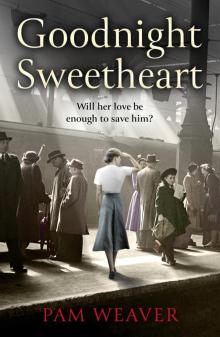 Goodnight Sweetheart
Goodnight Sweetheart At Home by the Sea
At Home by the Sea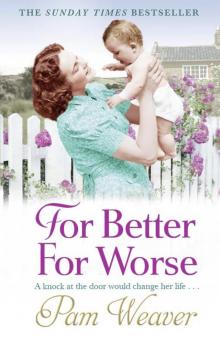 For Better For Worse
For Better For Worse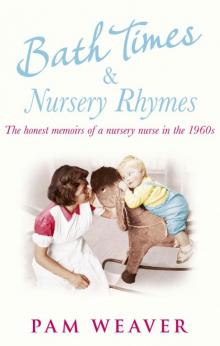 Bath Times and Nursery Rhymes
Bath Times and Nursery Rhymes Love Walked Right In
Love Walked Right In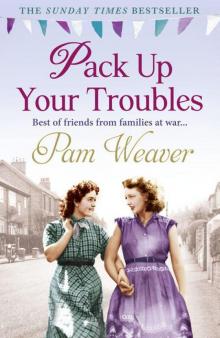 Pack Up Your Troubles
Pack Up Your Troubles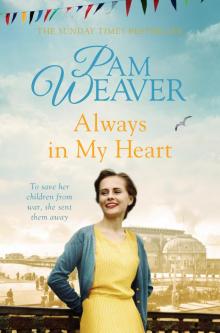 Always in my Heart
Always in my Heart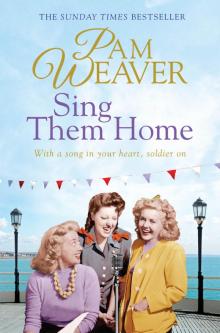 Sing Them Home
Sing Them Home Amy's Seaside Secret
Amy's Seaside Secret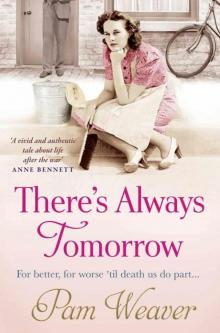 There’s Always Tomorrow
There’s Always Tomorrow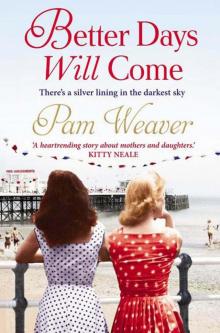 Better Days Will Come
Better Days Will Come Family Drama 4 E-Book Bundle
Family Drama 4 E-Book Bundle